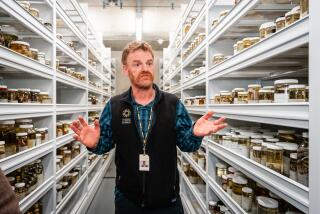New Drug Shows Promise in Heart Attack Prevention
- Share via
ANAHEIM — A new anti-clotting agent modeled after a snake venom could prevent as many as 40,000 heart attacks and 10,000 deaths each year if used routinely, researchers reported Monday.
The new drug, called tirofiban, reduces heart attacks and deaths by half in patients with so-called unstable angina, the most common cause of hospital admissions in the United States, physicians told a meeting of the American College of Cardiology in Anaheim. Such patients come to emergency rooms with all the symptoms of a heart attack, but their coronary vessels are not completely clogged and they do not require clot-busting drugs such as tPA (tissue Plasminogen Activator).
Untreated, many of these people would have heart attacks. With the best available blood thinning therapy now--aspirin and heparin--nearly 1 in 12 have heart attacks during their hospital stay.
Administration of the new drug, along with aspirin and heparin, prevents a clot from growing larger, reducing the risk of heart attack and giving physicians time to decide if angioplasty or bypass surgery is necessary.
“This is a breakthrough study,” said Dr. H. Vernon Anderson of the University of Texas in Houston. “To reduce deaths by 50% is very dramatic. This drug gives us a great opportunity to make meaningful reductions in the number of heart attack deaths.”
Tirofiban “really opens up the treatment of unstable angina,” added Dr. Eugene Braunwald of Brigham and Women’s Hospital in Boston. “It’s a real advance.”
Representatives of Merck & Co., which manufactures the drug under the trade name Aggrastat, said the company plans to apply to the Food and Drug Administration later this year for permission to market the drug. A related drug, ReoPro, produced by Centocor Inc., has already been approved by the FDA to prevent clot formation during angioplasties, where a balloon is inflated in a clogged artery to open it.
Centocor representatives said Monday that previously unreported results from their own clinical trial show that ReoPro gives at least as good a benefit in unstable angina as tirofiban.
In treating unstable angina, the anti-clotting drugs would be used almost as soon as the patient shows up at the hospital. Tirofiban “buys time” for heart specialists to determine the best treatment for the patient, said molecular biologist Rick Saxe of Merck, who developed the drug.
Dr. Harvey D. White of Green Lane Hospital in Auckland, New Zealand, who headed one of the two studies presented Monday, estimated that tirofiban could save 13 lives per 1,000 unstable angina patients. The widely touted tPA, in contrast, saves 10 lives per 1,000 heart attacks.
Most heart attacks and deaths in the 1.3 million Americans who suffer unstable angina each year occur when blood platelets aggregate into a clot in a blood vessel leading to the heart, impeding blood flow or completely blocking it. Researchers know of at least 90 different biological pathways through which clots can build up. Aspirin, one of the most effective clot-preventers, blocks only one of those 90 pathways and heparin is little better.
Looking for better agents, researchers turned to snake venom. When they bite, poisonous snakes inject a very effective anti-clotting agent that allows their venom to spread throughout the victim’s body. Tirofiban, Sax said, is a “designer molecule” that incorporates some of the best features of snake venom, while eliminating those that cause adverse effects. It blocks all 90 pathways to clotting, he added.
In the first of the two studies reported Monday, 773 patients received heparin and tirofiban and 797 received heparin. All received aspirin.
Compared to those who received only heparin, patients who received tirofiban and heparin had a 47% lower risk of heart attack in the seven days after they were admitted to the hospital, according to Dr. Pierre Theroux of the Montreal Heart Institute, who led the study. Their combined risk of heart attack and death was 44% lower after a week, he said.
In the second study, led by White, 1,615 patients who were not as ill as those in the first study received tirofiban, while 1,616 received heparin. Again, all patients received aspirin.
Within 48 hours of starting treatment, patients who received tirofiban had a 36% lower combined risk of heart attack and stroke, White said. At the end of 30 days, the drug had reduced deaths by 39%.
No adverse reactions were observed in either study and, in particular, no deaths from hemorrhage.
“Taken together, in these studies Aggrastat improved outcomes for people with unstable angina, whether or not they go on to have procedures to improve the flow of blood to the heart,” White said.
The results seemed to be equally good for men and women, for patients with diseases such as diabetes and for the young and the old, Sax noted. (One patient in the study was 100.) And, he added, “The sicker you are, the more benefit you receive.”






